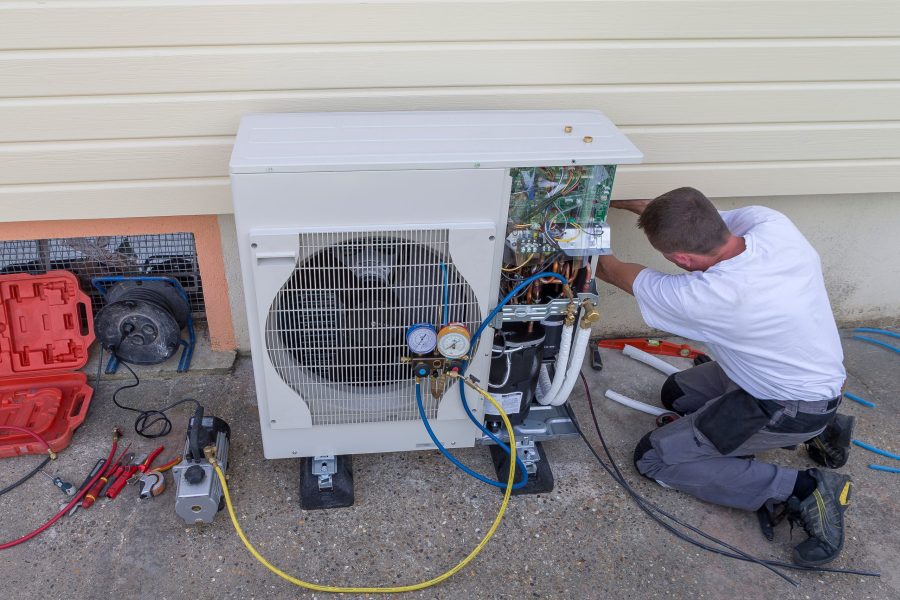Switching to Heat Pumps in Lexington
PUBLISHED SEPTEMBER 2023
Q: I want to switch my home’s fossil fuel heating systems to all-electric heat pumps for the health, cost, and climate benefits, but could use some advice on how to get started.
A: Fortunately, Lexington has launched a HeatSmart Advisor program to help folks like you get your heat pump questions answered. You can talk to one of Lexington’s trained volunteers who have been through this process themselves and are committed to helping their neighbors find effective clean heat solutions. Let’s take a look at some common HeatSmart questions and some success stories where switching to heat pumps has worked well here in Lexington. Lexington currently has about 1,100 homes heating with heat pumps.

Q: Can I replace my air conditioning system with a heat pump?
A: Yes, every older air conditioner near the end of its useful life should be replaced with a heat pump. Air conditioners are just heat pumps that can only pump heat in one direction. A heat pump has a reversing valve that allows a heat pump to pump heat in two directions, keeping you warm in the winter and cool in the summer. Australians call heat pumps reverse-cycle air conditioners.
Mass Save provides up to $10,000 in rebates for installing whole house heat pumps. That rebate will more than cover the difference in cost between a heat pump and an air conditioner. You’ll actually save money by installing a heat pump instead of a new air conditioning system.
Replacing an air conditioner with a heat pump is a much easier decision than replacing a heating system. It is an inherently low risk decision. You get a more efficient air conditioner and a heat pump for free. No one should ever buy another air conditioner. Would you buy a car that couldn’t drive in reverse to save the cost of a reverse gear and backup lights? Of course not.
Q: Can heat pumps heat our homes on the coldest New England winter nights?
A: Yes, the latest generation of cold climate heat pumps are designed to provide heat all the way down to -13°F and some to even -22°F. They are capable of delivering 100% of their rated heating capacity down to 5°F and some to even -5°F. Lexington’s average temperature in December is 33°F, 28°F in January, and 29°F in February.
Heating engineers design heating systems to provide full rated capacity down to a local design temperature that covers 99% of the heating hours in a year. In Lexington, that 99% design temperature is 7°F. 99% of all the heating hours in Lexington are above 7°F. The coldest temperature we’ve experienced in the last 18 years has been four hours at -13°F. That’s only 0.003% of Lexington’s heating hours.
Lexington’s HeatSmart clients report that their heat pump systems have handled the coldest winter nights without a hiccup.
Q: Can heat pumps save money on fuel costs?
A: A cold climate heat pump saves $1,900 a year compared to an average oil heated home, $1,750 a year compared to a propane heated home, and about $300 a year compared to a natural gas heated home, based on last winter’s fuel costs. Low-income customers save even more because low-income electricity bills receive a 42% discount, while low-income natural gas bills receive a 25% discount. Customers powering their heat pumps with solar energy systems would save an additional $1,400 a year.
Gas delivery costs will continue to rise as more and more people switch from gas to heat pumps and the fixed gas pipeline costs are shared by fewer and fewer customers. Delivery costs are likely to double by 2030 due to this effect. Gas delivery rates will also rise rapidly due to the cost of the $40 billion pipeline replacement program that is currently underway in Massachusetts. When gas delivery costs double, the cost of heating with gas will exceed the cost of heating with oil or propane.
Q: Do heat pumps lower emissions?
A: Heat pumps dramatically reduce the amount of energy needed to heat our homes, because they are able to deliver 3 kWh of heat (from sunshine heated air) for every 1 kWh of electricity they use. That reduction in energy use translates to significant emissions savings, about 75% lower greenhouse gas emissions compared to heating with oil or natural gas after accounting for gas leaks. Customers powering their heat pumps with solar power or renewable electricity reduce greenhouse gas emissions by 99%.
Q: I still have some additional questions related to my house.
A: Everyone’s situation is different. That’s why the HeatSmart Advisor program was started. Scan the QR code to sign up for a conversation to learn how you can achieve your goals for your unique home.
My attempts to switch to heat pumps stalled when I was trying to do it on my own. But things got much easier when I was able to have a conversation with a HeatSmart advisor. My coach answered my questions and gave me the confidence to move forward – both from a technical and an economic perspective. My coach pointed me to some trusted vendors who were willing to do the type of installation that was needed for my home.
Once I had confidence that the proposals were reasonably priced, properly designed, and would qualify for the Mass Save rebate, I pulled the trigger and moved forward. The HeatSmart coach was the catalyst I needed.
My overall experience with the heat pumps has been great. The air source heat pumps had more than enough capacity to cover all my home’s heating needs. My heating costs ended up being slightly lower than the cost to heat my home with gas. So it is possible to deliver a whole home heat pump retrofit for an older home that actually saves energy costs versus natural gas, dramatically reduces emissions, and provides equivalent comfort even during the coldest nights.
Send your sustainability questions to questions@sustainablelexington.org.

of the Sustainable Lexington Committee
